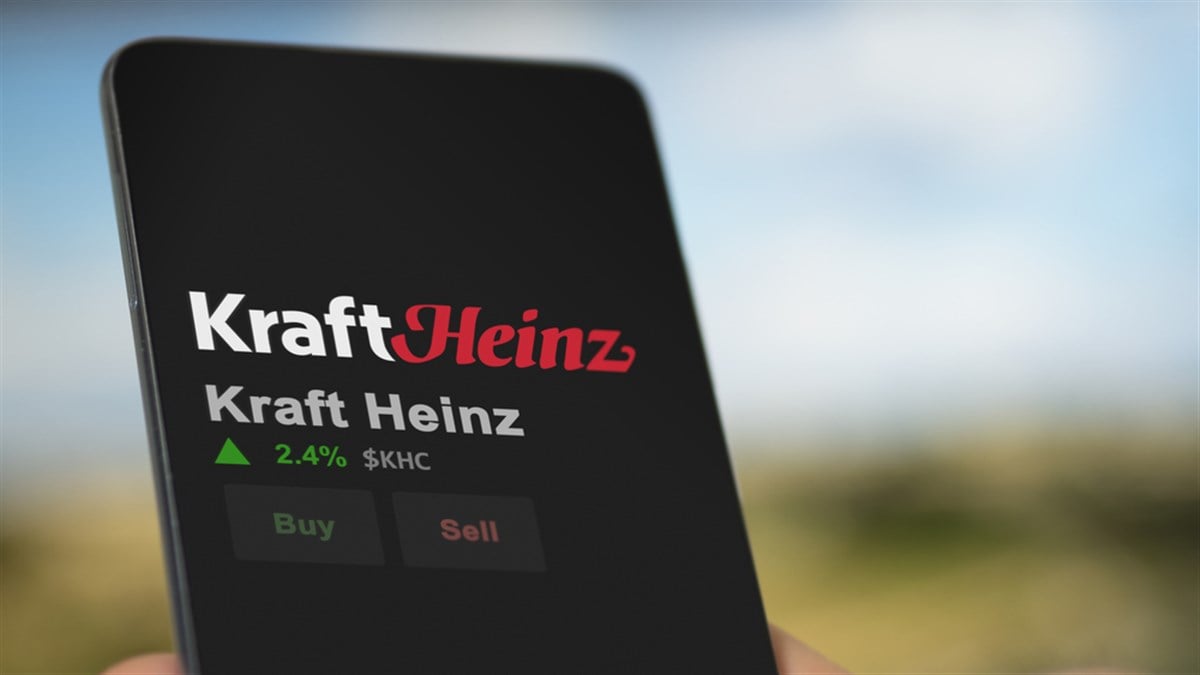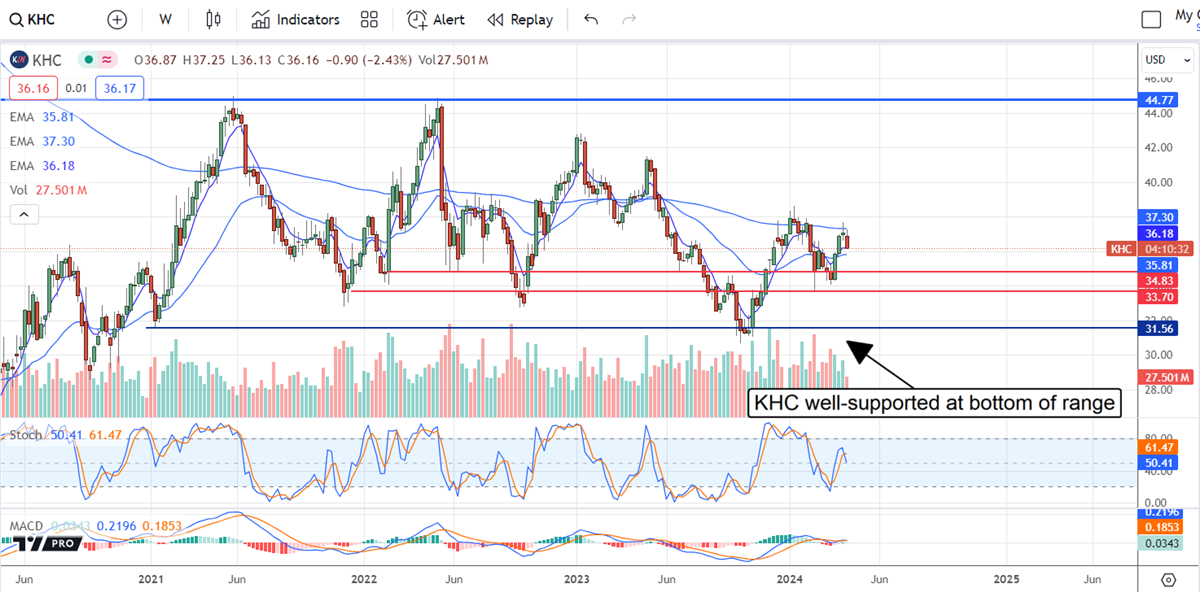
The Kraft Heinz Company (NASDAQ: KHC) resulted from merger activity that began with Kraft’s separation from Mondelez in 2012. The separation from Mondelez (NASDAQ: MDLZ) and eventual merger with Heinz in 2015 was intended to split competing business segments to streamline operations, invigorate growth, and drive capital returns for investors. The early efforts faced numerous headwinds, including an accounting scandal that opened up a deep-value opportunity for investors in 2018. That opportunity is still in play.
After six years of effort, Kraft Heinz’s turnaround efforts began to gain traction in 2023. Today, the company is the 18th largest global consumer staple and #5 in packaged foods. The packaged foods strategy focuses on high-quality brands, products, flavor enhancements, easy meals, snacking, and hydration. Some brands owned and marketed by Kraft Heinz include Oscar Meyer, Ore-Ida, Kraft Mac & Cheese, Velveeta, Kook-AID, Jell-O, A-1, Heinz Ketchup, and Grey Poupon. There are many others.
Ironically, Kraft is no longer a major player in the cheese business. The company sold its Kraft Natural Cheese business to Group Lactalis in 2020. The move removed a lower-margin business from the portfolio, provided cash and liquidity for the turnaround, and allied the company to focus on supporting its existing business in North America and growth plans in international markets.
Kraft Heinz Stock Performance Overview
Kraft Heinz stock price has been range bound for three years, since 2021, when the broad market bounced back from the COVID-induced lows. The price action has been bouncing within the range ever since due to a firming buy-side sentiment and overhead resistance. The stock is down more than 50% from its high and has yet to break above the critical resistance point. That point is at the top of the range near $44.50, a level set when the market capitulated in 2019.
Kraft’s performance relative to the broad market is poor. KHC stock has been flat over the last three years, while the S&P 500 (NYSEARCA: SPY) trades have been at record highs. The comparison to the consumer staple sector is better but not great. The industry is down from its record highs but trading near them and in rebound mode. The consumer staples sector corrected sharply in 2023 on fears of tighter margins, consumer push-back, and business contraction that were largely unfounded. It’s heading higher, and the all-time highs may be retested before the year's end.
Factors Influencing Kraft Heinz Stock Prices
The internal factors affecting Kraft Heinz investment analysis are results and capital returns. The company’s 2018/2019 stock price implosion was partly due to the distribution cut, which left the payout above 4% relative to today’s price action. The company has paid the lowered amount faithfully since and has worked hard to improve the balance sheet, cash flow, and dividend health. Evidence that the efforts are working is an incrementally declining payout ratio, improved free cash flow, debt reduction, and recently reinstated share repurchases.
Kraft Heinz board approved $3 billion in share repurchases over three years beginning FQ4 2023. The $3 billion in repurchases is worth about 6.5% of the market cap, with the stock trading near the middle of its trading range. The repurchases will offset the dilutive impact of share-based compensation and aid EPS growth over time. The share count fell marginally in Q4 and should continue to decline as excess capital is generated. The plan is to first maintain the target 3.0X leverage ratio, invest in growth second, and repurchase shares 3rd.
External factors influencing Kraft Heinz stock analysis are analysts and institutional holders. Analysts have raised their price targets and sentiment ratings over the last year. They have lifted the consensus sentiment to Moderate Buy from Hold with a price target of $40. The $40 target implies a 10% upside from early April price action and another 5% to 10% at the ranges’ high end.
Institutions have been buying this stock on balance quarterly for the last three years and own nearly 80%. Notably, Warren Buffett and Berkshire Hathaway (NYSE: BRK.A) are early investors, large investors, and long-time holders of KHC. The firm hasn’t made any purchases in years but owns 26% of the stock and has been content to sit on it since he first bought Heinz in 2012. Mr. Buffett and Berkshire Hathaway were instrumental in the merger of Kraft and Heinz.
Kraft Heinz Dividend Policy and Returns
Kraft Heinz doesn’t have a specific dividend policy. The dividend is at the board's discretion, and the board chooses to pay a substantial amount. The payout ratio runs near 53% in early 2024 and is noteworthy because it is back in range for the industry, with health improving. The takeaway for investors is that Kraft Heinz stock dividends are on track for distribution increases, a significant catalyst for the market. Because the stock has a high-yield value, trading near 12X earnings and paying 4.3%, the price action could advance by high-double to low-triple-digits over the next few years.
Financial Performance and Revenue Growth
Pandemic trends, the post-COVID bubble, supply chain issues, and turnaround efforts have greatly influenced Kraft Heinz financial performance over the past four years. The salient point is that the company sustained annual growth throughout the period and only entered contraction in Q4 2023. The guidance and analysts' forecasts suggest that 2024 will be a flat to up year, with 2025 producing accelerated growth as economics, repositioning, and acquisitions come into alignment.
The story is as much about margin as Kraft Heinz revenue growth, if not more. 2023 growth was tepid but included the impact of an extra week in the previous year and wider margins. The gross margin improved by 280 basis points, adjusted by 240 bps, to deliver a double-digit income growth. Regarding its competition, Kraft Heinz's gross margin aligns with many of its peers but lags behind packaged food leaders Mondelez and Hershey (NYSE: HSY). Mondelez's gross margin is about 300 basis points better, Hershey’s is about 1000, but Kraft is working hard to narrow the gap.
The top-line growth is not expected to be robust even in 2025, but margins are expected to widen and drive accelerated 5.5% bottom-line growth. Growth in 2024 will be underpinned by pricing. Pricing actions are expected to underpin results through year-end, with volume pivoting back to growth in the back half. The pivot back to growth will turn a headwind into a tailwind and may result in better-than-forecast results.
Investment in Innovation and Market Expansion
Kraft Heinz is investing in the business in many ways. The bottom line is that technology enables efficiency while aiding growth and margin and shifting toward greener operations. The company is on track to deliver $2 billion in annualized cost savings. It uses the freed cash flow to boost advertising and marketing, technological innovation, and targeted acquisitions, aiding growth and market share.
The company’s most promising growth avenue is International. Kraft Heinz has made several major acquisitions since 2020 to support the strategy and is building a global capacity center in India. The center is intended to be a center of operations in India, a market projected to grow by triple digits over the next decade. International expansion could double the company’s business within the next decade.
Market Trends and Competitive Analysis
Three primary factors impact Kraft Heinz market trends and consumer goods stocks analysis today. The first is normalization. Consumer habits are normalizing or normalized following the days of pantry-hoarding and self-imposed isolation. Consumers are eating at home less and venturing out more, so the refocus on food service is timely. Kraft Heinz reaffirmed its intent to deliver on long-term goals through its three pillars earlier this year, including Global Away From Home.
The 2nd is inflation. Inflation has been raging for three years and has impacted everything from gasoline to housing and all things in between. The impact of inflation has caused some consumers to trade down to lower price-point items, but Kraft-Heinz has been resilient. While it is experiencing elasticity in its markets, many of its products are category-leading household names that will never be replaced. Those include Kraft Macaroni and Cheese, Heinz Ketchup, Oscar Myer deli meats, and Ore-Ida potato products. Ultimately, the market share counts and Kraft is gaining it.
The last is interest rates. The rise of inflation has resulted in high interest rates, and the two are squeezing consumers. However, Kraft’s market share gains and international expansion efforts offset the impact and provide a pathway to growth. 2024 will be a pivotal year for the business, leading to accelerating results in 2025. Because inflation is receding and the FOMC is expected to begin cutting rates soon, headwinds related to high inflation and interest rates are expected to ease.
Kraft Heinz Stock Forecast for 2024
Kraft Heinz stock price is range-bound and will likely remain so this year. Kraft Heinz stock forecast 2024 is favorable, but the market has been unable to sustain traction despite improvements in operations, growth, and capital returns. Because the stock trades at a deep value to its peers at 12X earnings and is on track to grow and sustain capital return increases, it is a buy anywhere within the range, but investors shouldn’t chase price action. Instead, waiting for price pullbacks within the range is advisable.
The critical support level is near $33.75 and is unlikely to be broken. However, the market could move to $32, and the range remains in play. Critical resistance is near $38 and may cap gains until later in the year. A move above $38 would be significant by setting a 1-year high. In this scenario, the market could continue upward until hitting the next critical target near $40. The $40 target aligns with the analysts' consensus.
The long-term outlook for price action is robust. The stock is high-yielding, undervalued, and on track to resume and sustain dividend increases, a powerful tailwind for price action. In this scenario, the stock could experience a price-multiple expansion that doubles its value by the decade's end.
Conclusion: Is Kraft Heinz a Buy, Sell, or Hold?
Kraft Heinz is among the world’s leading consumer staples and packaged food companies. It fell on hard times but bounced back and is stronger than ever. The company is growing share and expanding internationally, focusing on food at home and away, providing leverage for investors. Margins are widening, earnings are improving, the balance sheet is healthy, and capital returns flow. The latest indication of the company’s success includes the resumption of share repurchases, which will amplify earnings growth and improve shareholder value.
The stock trades at a low 12X earnings. The low valuation was earned but now undervalues the business. Among the catalysts for a higher share price are growth, a wider margin, and an increase in the dividend, which might trigger a price-multiple expansion. Leading players in this sector have similar dividend health and trade 2X to 3X higher, suggesting this stock could advance 100% to 200% from the mid-$30s.
Analysts' activity has been mixed, but the takeaway is all bullish regarding the sell-side. Analyst have lifted their sentiment ratings enough to drive the consensus to Moderate Buy from Hold and raise the price target by 20%. The price target is 10% above the current action and leading the market, indicating that Kraft Heinz stock buy or sell question is answered. 





